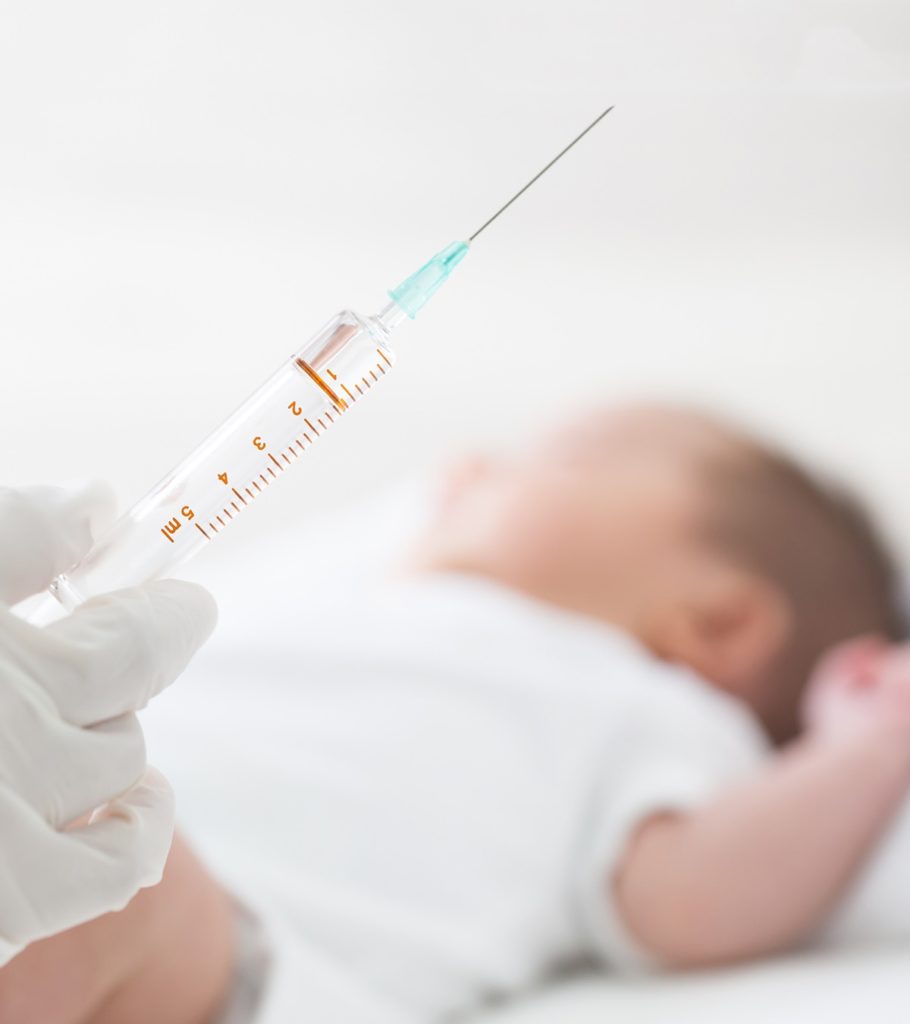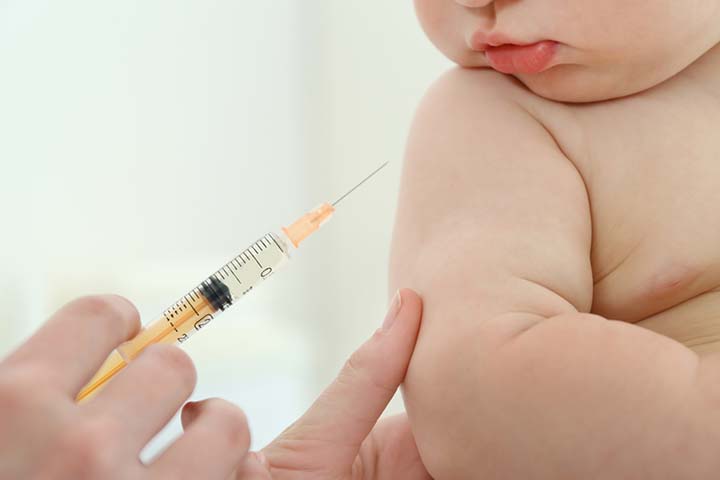Vaccination is the best way to prevent several illnesses in babies. However, vaccination may have its share of side effects in some cases (1). Fever after vaccination in babies is one of the side effects, which often include pain and swelling at the injection site (2).
Fever after vaccination is often benign and manageable at home with simple interventions. Read this post to know the causes and management of fever after vaccination in infants.
Is It Normal For Babies To Have A Fever After Vaccination?
Yes. Like many other medicines, vaccinations can also cause side effects. Mild to moderate fever, pain, and/ or swelling at the site of injection, fussiness, and irritability are some of the side effects of vaccines (3). Though any vaccine can cause fever, a few vaccines like DPT are more common to produce febrile reactions.
Since the benefits of vaccines outweigh the risks, doctors across the world recommend immunization. Contact your baby’s pediatrician if you notice a high fever after vaccination in your baby.
Could not load the poll.
Why Do Babies Get A Fever After Vaccinations?
Dr. Laura Purdy, a US-based board-certified family medicine physician, says, “The immune system’s response can result in an elevation of temperature. Fever can appear within the first few hours after vaccination. Certain vaccines, especially live vaccines, can even cause fever for many days, especially in younger children.”
The body’s immune system brings an inflammatory reaction in response to the foreign substance -vaccine.
It manifests as redness, swelling, or pain at the site of injection or other systemic responses like fever, body ache, or headache (5).
Having mild fever in response to a vaccine is normal. It means that the vaccine is working, and your body is producing antibodies to fight the infection. A mild fever usually develops within 24 hours of vaccine administration and may last for two to three days (6).
Medical attention is not required for the minor reactions that occur after vaccination.
After giving the vaccination, the healthcare provider will tell you about the side-effects it could possibly have on the baby, with fever being one of them.
When To See The Doctor?
It is possible for your baby to experience irritability within the first 48 hours after receiving vaccinations. However, you need to see the doctor in the following scenarios (6).
- High fever over 104°F (40°C)
- Fever lasts for more than three days and is accompanied by sweating or chills
- Fever returns after reducing for 24 hours
- Baby is experiencing congestion, cough, and drowsiness
- Nausea, vomiting or diarrhea
- Continuous crying for three hours or more
- Showing unusually lethargic and inactive behavior or unresponsive to normal stimuli.
- If the redness around the injection site grows larger than three inches in diameter
- Measles vaccine rash that lasts for more than four days (it starts six to 12 days after vaccine administration)
- If the baby appears sick and does not eat (appetite loss) or sleep well
Most effects of vaccines, such as irritability, fussiness, redness, muscle aches, fatigue, swelling, pain, and fever, begin to subside after three days of vaccine administration. Contact your pediatrician if they last longer.
Contact emergency care if your baby exhibits the following symptoms after vaccination (7).
- Difficulty in breathing
- Hives
- Difficulty swallowing
- Swelling of the throat
- Fast heartbeats
- Hoarseness of voice
- Wheezing
- Convulsions or seizures
Severe reactions to vaccines are quite rare, but keep an eye on your baby. If you suspect anything unusual, contact the healthcare provider immediately.
Could not load the poll.
How To Deal With The Fever After Vaccination?
If your baby develops a mild to moderate fever after vaccination, then the following steps might help you manage the distressed baby (8).
- Do not cover the baby in layers of clothes or blankets. Dress in comfortable, loose, and breathable clothes.
- If you are breastfeeding the baby, then they might feed more often for one or two days after vaccination.
- If your baby is on a solid diet and refuses to eat, then you can consider a liquid diet. Give your baby formula, broth, and purees that are easy to eat and digest.
- Ask the doctor for a prescription of acetaminophen or ibuprofen medication. These medicines can help subdue fever and irritability. Never self medicate but only provide a dosage as recommended by your baby’s pediatrician.
Your child might be a little irritated and unwell after the vaccines. But the benefits of the vaccine significantly outweigh the risks. Therefore, vaccinate your baby as per the recommended schedule.
According to the World Health Organization (WHO), around 20 million children worldwide still do not get vaccinated, increasing the risk of serious diseases, death, and disabilities (1). Vaccinations are important for babies. Mild side effects, such as fever, irritability, pain, and swelling, after vaccination in babies, are temporary and mostly subside within three days. Having a fever is an indication that the vaccine is working in the body, so there is no need to worry, and simple precautions can manage it. However, if the baby experiences a high fever, vomiting, lethargy, or difficulty breathing, you should consult a doctor.
Key Pointers
- Fever after vaccination is normal, and it occurs when the body identifies a vaccine as a foreign substance and triggers a systemic response.
- Mild fever lasting two to three days after vaccination doesn’t require medical attention.
- However, consulting a pediatrician is vital if the baby has a high-grade fever, vomiting/diarrhea, or a fever lasting more than three days.
- Dressing the baby in comfortable, breathable clothes, feeding them often, and using prescribed antipyretics are a few ways to manage fever after vaccination.
Vaccinations can be painful for babies and they may even develop a fever after a shot. In this video, learn what to expect after a vaccination shot and ways in which you can comfort your child.













